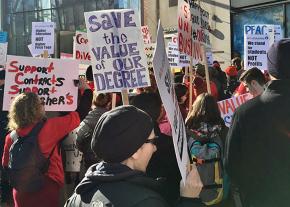Part-time faculty send a message in Chicago
explains the background to a two-day strike by part-time faculty at Columbia College in Chicago--and reports on the mobilizations to support them.
A TWO-day strike by part-time faculty at Columbia College in Chicago brought hundreds of students and faculty to the picket line to oppose the administration's attempts to intimidate union members and cut student resources.
On November 22, an overwhelming majority--88 percent--of members of the Part-Time Faculty Association, or P-fac, voted to strike on November 29 and 30, in response to the administration's refusal to bargain in good faith with the union.
P-fac represents some 1,200 part-time adjuncts at Columbia whose contract expired in August and who are protesting the administration's last insulting contract proposal, which guts many of the gains made in the last contract, removing all protections for job security, seniority, a paid sick day and academic freedom. Columbia adjuncts also have no health care or retirement benefits and aren't paid a living wage.
Alongside union members on the picket line were members of OurColumbia, a coalition formed in mid-November to unite students with faculty against rising tuition costs, increased class sizes, department budget cuts and the practice of canceling classes with little notice to faculty and students.

"The overwhelming support for this strike is an indication of the severity of the current situation," said P-fac President Diana Vallera, in a union press release. "The college is implementing a climate of fear and intimidation, reflecting a larger national crisis for labor. Columbia is emboldened by Trump and ignoring basic labor law by bargaining in bad faith and union busting. They want to break the union, assign courses to the least experienced and cheapest."
ON THE first day of the strike, students turned out to showed their support. Many had heard about the strike through their professors, and in some cases, whole classes came out to show their solidarity.
Members of other unions across the city—including the Chicago Teachers Union (CTU), American Association of University Professors and SAG-AFTRA—mobilized to show solidarity with P-fac at Columbia. "[The turnout] makes me sure there's cause for concern and enough reason to be here," said Andrea Dymonte, a member of P-fac who has taught theater at Columbia for 11 years.
Faculty and students alike expressed concern for the way changes the administration is making will affect the quality of education at Columbia. "Our class sizes are growing from 15 to 20 or 25," said one professor. "Budgets are being cut, tuition is going up, class sizes are growing, and we aren't being paid more for it."
"One of the main reasons that I chose Columbia as a school is because of the small class sizes," said Maddie, a sophomore photography student and OurColumbia member. "I'm a photo major, and within the photo department, they've cut back on a lot of facilities...Budget cuts have happened within our department, but we're still paying more for tuition. It doesn't feel like it's worth it to me anymore."
Many students supporting the picket line argued that the issues P-fac members are fighting for are also greatly affecting students. "I'm personally upset because a few of the classes that I wanted to take next semester are with teachers who are getting fired," said junior Clayton Crook.
Another student, Rowan, said: "I'm seeing classes disappearing when there are so few classes in my department. I'm seeing teachers hear from students that they don't have a class next semester to teach. I'm here right now because I want that to change."
Longtime civil rights activist, Columbia educator and P-fac member Prexy Nesbitt said at a press conference on day one of the strike:
This is not the Columbia that I met 30 years ago...This is a Columbia that has become corporatized and is full of too damn many vice presidents...
We've got part-time people who have to live out of their car. We've got part-time people who are struggling to get enough money to get to be able to make it to all the part-time jobs that they go to. We've got people who've lost their homes. We've got students who are graduating $80,000 or $90,000 in debt, and we've got vice presidents making over $150,000 a year.
The wage gap between part-time faculty and administrators was on the minds of many of the people who came out to support the strike.
Asked if they were aware that some administrators made upward of $200,000 per year, first-year documentary film student Sasha Rosenberg replied: "That's not surprising at all. That's expected. Our tuition is going up, and the salaries of faculty aren’t going up. Where does all this money go? I'm confused. It's a corporation, it's a business--it's not a school. That's how I see it in my eyes."
College administrations around the country are taking an approach to education that prioritizes profits over the interests of faculty, staff and students--and Columbia is no exception. As Jeff, a P-fac member, pointed out: "Take a long hard look at applying corporate models to educational institutions, and see how that shifts values away from the stated mission--education and learning--to profit."
The issue of corporate control of education is nothing new for Chicago schools. As CTU Vice President Jesse Sharkey said during a press conference in solidarity with striking Columbia faculty:
We know that the drive to make education into a privatized profit center, a place that business feels at home is against the human impulses in our schools. If allowed down that road, they will keep going, and we'll find that this is just one more expression of corporate rule in our country. We will fight that.


